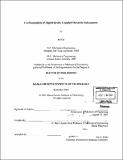| dc.contributor.advisor | H. Harry Asada. | en_US |
| dc.contributor.author | Gu, Bei, 1970- | en_US |
| dc.contributor.other | Massachusetts Institute of Technology. Dept. of Mechanical Engineering. | en_US |
| dc.date.accessioned | 2005-08-23T22:25:27Z | |
| dc.date.available | 2005-08-23T22:25:27Z | |
| dc.date.copyright | 2001 | en_US |
| dc.date.issued | 2001 | en_US |
| dc.identifier.uri | http://hdl.handle.net/1721.1/8695 | |
| dc.description | Thesis (Ph. D.)--Massachusetts Institute of Technology, Dept. of Mechanical Engineering, 2001. | en_US |
| dc.description | Includes bibliographical references (leaves 108-110). | en_US |
| dc.description.abstract | In the manufacturing industry out-sourcing/integration is becoming an important business pattern (not a clear statement-integration still done in house-component design and manufacturing outsourced). An engineering system often consists of many subsystems supplied by different companies. Bridge between thoughts is weak. Object-oriented modeling is an effective tool for modeling of complex coupled systems. However, subsystem models have to be assembled and compiled before they can produce simulation results for the coupled system. Compiling models into simulations? is time consuming and often requires a profound understanding of the models. Also, the subsystem makers cannot preserve their proprietary information in the compilation process. This research is intended to address this problem by extending object-oriented modeling to object-oriented simulation called co-simulation. Co-Simulation is an environment in which we can simultaneously run multiple independent compiled simulators to simulate a large coupled system. This research studies a major challenge of object-oriented simulation: incompatible boundary conditions between subsystem simulators caused by causal conflicts. The incompatible boundary condition is treated as an algebraic constraint. The high index of the algebraic constraint is reduced by defining a sliding manifold, which is enforced by a discrete-time sliding mode controller. The discrete-time approach fits well with the numerical simulation since it can guarantee numerical stability. | en_US |
| dc.description.abstract | (cont.) A Boundary Condition Coordinator (BCC), which implements the discrete-time controller, makes the incompatible boundary condition compatible. Multi-rate sliding controllers are developed to guarantee the stability of the sliding manifold with any integration step size for the subsystem simulators. A multi- rate sliding mode scheme is specially devised to minimize information disclosure from the subsystem simulators and to facilitate pure numerical computation. The influence of the BCCs on the rest of the subsystem simulators is studied using the input-output linearization theory. The Co-Simulation software environment is developed in Java. Subsystem simulators and BCCs run as independent processes in the Co-Simulation environment. Class templates containing all necessary functions for different types of subsystems are defined. Engineers can easily build a subsystem simulator by simply providing only the mathematical model, which will be hidden after the subsystem simulator is made. Integration engineers can assemble subsystem simulators into simulation of the large coupled system by merely making connections among subsystems. The object-oriented class design makes it possible to extend the Co-Simulation over the Internet or to compile subsystems into a single thread simulator. | en_US |
| dc.description.statementofresponsibility | by Bei Gu. | en_US |
| dc.format.extent | 110 leaves | en_US |
| dc.format.extent | 7973079 bytes | |
| dc.format.extent | 7972838 bytes | |
| dc.format.mimetype | application/pdf | |
| dc.format.mimetype | application/pdf | |
| dc.language.iso | eng | en_US |
| dc.publisher | Massachusetts Institute of Technology | en_US |
| dc.rights | M.I.T. theses are protected by copyright. They may be viewed from this source for any purpose, but reproduction or distribution in any format is prohibited without written permission. See provided URL for inquiries about permission. | en_US |
| dc.rights.uri | http://dspace.mit.edu/handle/1721.1/7582 | |
| dc.subject | Mechanical Engineering. | en_US |
| dc.title | Co-simulation of algebraically coupled dynamic subsystems | en_US |
| dc.type | Thesis | en_US |
| dc.description.degree | Ph.D. | en_US |
| dc.contributor.department | Massachusetts Institute of Technology. Department of Mechanical Engineering | |
| dc.identifier.oclc | 49837078 | en_US |
